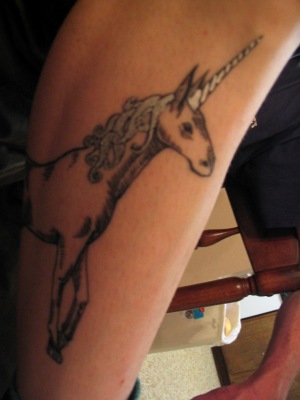Looking for Jake
 I expect this will be the last China Miéville book i read for a while, because i think i've read everything published to-date.
I expect this will be the last China Miéville book i read for a while, because i think i've read everything published to-date.Waiting for Jake is a collection of short stories, one of which was the germ of my entire interest in Miéville. Months and months ago, Waiting for Jake was lying around the coffee-table as Mykle and Kai read it, and i picked it up one day and read the story Certain Events in London, which has to be one of the finest science fiction short-stories of all time. I leafed thru a few of the other stories but didn't really find them very engaging except Details.
Four or five months and as many full-length novels later, i read Waiting for Jake front-to-back with barely a word or two skipped here and there and enjoyed every bit.
Certain Events in London remains for me the stellar piece: it presents the idea that there exist certain autonomous streets which phase in and out of existence, living complex and mysterious lives of their own, and even having ramances and violent fueds amongst their alley selves. "The Via Ferrae", i believe they're called.
The story is presented in meticulous Lovecraftian style, with the primary narrative being more or less journal entries which spend most of their time relating hints and clues from other accidentally-found documents. Very indirect, tantalizing, and convincing.
You know how sometimes a cloud looks like something or more specifically how there will be a face in the shag carpet or in the cracks and marks in the ceiling ? Details posits that it doesn't just *look* like a face; it actually is a face, a real presence, which is only manifest in rare just-so circumstances. It goes further to tell the story of one poor person who becomes adept at seeing the faces in seemingly random patterns, and unfortunately can't stop seeing a particular face and being, which forms in the noise of clouds, leaves, bricks, stucco, etc, and more or less hunts our hero down.
The rest of the stories are good as well.
If you like them i really recommend checking out Thomas Liggoti, as i think by and large he's still got a leg up on China in the existential-horror department.


